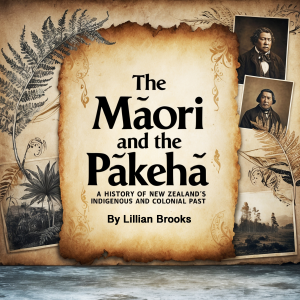

The Māori and the Pākehā
Lilian Brooks
The history of New Zealand is deeply shaped by the complex and evolving relationship between the Māori, the country’s Indigenous people, and the Pākehā, the European settlers who arrived in the 18th and 19th centuries. This history is one of resilience, conflict, adaptation, and, ultimately, an ongoing quest for reconciliation. Understanding this shared past is essential to appreciating modern New Zealand’s identity and the challenges that continue to shape its future.
The Māori, skilled navigators and settlers from Polynesia, developed a rich and sophisticated culture long before the arrival of Europeans. Their societal structures, traditions, and connection to the land formed the foundation of a thriving civilization. When Pākehā explorers and settlers arrived, they brought not only new technologies and trade but also new challenges. The introduction of muskets, Christianity, and foreign diseases altered the balance of power and drastically reshaped Māori society.
One of the most defining moments in New Zealand’s history was the signing of the Treaty of Waitangi in 1840. This agreement, meant to establish a partnership between Māori and the British Crown, instead became a source of lasting controversy due to differences in interpretation and breaches of its promises. In the decades that followed, land disputes, armed conflicts, and government policies led to the large-scale alienation of Māori land, significantly impacting Māori communities and their way of life.
Duration - 3h 1m.
Author - Lilian Brooks.
Narrator - Eleanor Whitmore.
Published Date - Sunday, 12 January 2025.
Copyright - © 2025 Lilian Brooks ©.
Location:
United States
Description:
The history of New Zealand is deeply shaped by the complex and evolving relationship between the Māori, the country’s Indigenous people, and the Pākehā, the European settlers who arrived in the 18th and 19th centuries. This history is one of resilience, conflict, adaptation, and, ultimately, an ongoing quest for reconciliation. Understanding this shared past is essential to appreciating modern New Zealand’s identity and the challenges that continue to shape its future. The Māori, skilled navigators and settlers from Polynesia, developed a rich and sophisticated culture long before the arrival of Europeans. Their societal structures, traditions, and connection to the land formed the foundation of a thriving civilization. When Pākehā explorers and settlers arrived, they brought not only new technologies and trade but also new challenges. The introduction of muskets, Christianity, and foreign diseases altered the balance of power and drastically reshaped Māori society. One of the most defining moments in New Zealand’s history was the signing of the Treaty of Waitangi in 1840. This agreement, meant to establish a partnership between Māori and the British Crown, instead became a source of lasting controversy due to differences in interpretation and breaches of its promises. In the decades that followed, land disputes, armed conflicts, and government policies led to the large-scale alienation of Māori land, significantly impacting Māori communities and their way of life. Duration - 3h 1m. Author - Lilian Brooks. Narrator - Eleanor Whitmore. Published Date - Sunday, 12 January 2025. Copyright - © 2025 Lilian Brooks ©.
Language:
English
Opening Credits
Duration:00:00:09
Intro the māori and the pākehā
Duration:00:10:07
1 the māori and the pākehā
Duration:00:13:38
2 the māori and the pākehā
Duration:00:13:19
3 the māori and the pākehā
Duration:00:13:27
4 the māori and the pākehā
Duration:00:13:44
5 the māori and the pākehā
Duration:00:14:28
6 the māori and the pākehā
Duration:00:15:11
7 the māori and the pākehā
Duration:00:14:36
8 the māori and the pākehā
Duration:00:16:07
9 the māori and the pākehā
Duration:00:15:24
10 the māori and the pākehā
Duration:00:15:01
11 the māori and the pākehā
Duration:00:15:06
Conclusion the māori and the pākehā
Duration:00:11:27
Ending Credits
Duration:00:00:10